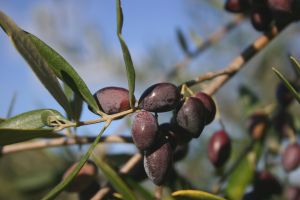


3rd Sunday of Lent Year B - 8/3/2015 - Gospel: Jn 2: 13-25
Chrism oils
Chrism oil is a pure olive oil mixed with balsam. Balsam is an aromatic substance that is extracted from the wood of certain trees added to the olive oil to give it a special smell and helps to identify it from the other oils. Once a year, at the Holy Thursday celebrations the priests of the diocese gathered around the bishop to concelebrate the Eucharist and the Bishop consecrates the Chrism oils. After the ceremony the Holy chrism Oils is distributed to the priests who take it to parishes and the remaining Holy chrism is being kept, locked securely and reverently guarded.
The Old Testament has recorded numerous numbers of cases that the oil was used to confer certain public offices and also for the religious ceremonies. It was used in the coronation of kings, in the consecration of the high priest and in the ordination of the Levites (For more details see Ex 30 and Levi 8).
The word 'Chrism' probably shares the same root word for Christ which means 'the Anointed One of God'. The early Church's fathers referred to the use of the Chrism as a visible outward sign that points inwardly by means of outpouring of God's grace to all the faithful who have been baptized. St Ambrose venerates in the Chrism Oil of grace. For others the Holy chrism is regarded as sacred and the sanctification of the faithful. Pope Benedict XVI says
Consecrated oil is always a sign of God's mercy.
Holy Chrism is used in the consecration of churches and alters. It is used to bless the sacred vessels, chalices and paten used in the Eucharist which comes in contact with the Sacred Species. At baptism the first anointing serves as purification and dedication of that person to God and the second appointing serves as sanctification and to strengthen with the power of the Holy Spirit for the fruitful of the threefold offices, namely priest, prophet and king. The anointing at confirmation by the bishop confers the Holy Spirit upon a person that the Holy Spirit will strengthen the person to live a life of the above threefold offices. The Anointing of the Sick symbolizes strength that God gives those anointed through the grace of this sacrament. When a priest is ordained the bishop anoints the hands of a priest and the bishop is ordained his head is anointed with holy Chrism and that is a symbol of the consecration and dedication for the ministry.
Chrism has been used in liturgy because of its symbolical significance. The olive oil, by nature, is rich and diffusive and abiding and is fitted to represent the outpouring of God's grace through the sacraments. Balsam gives forth fragrant odour that typifies the innate sweetness of Christian virtue. Oil gives strength to our physical body while the balsam preserves from corruption. Anointing with chrism rightly signifies that the fullness of grace and spiritual strength we receive helps us to resist any temptation to commit sin and produces the sweet smell for Christ.
The Old Testament has recorded numerous numbers of cases that the oil was used to confer certain public offices and also for the religious ceremonies. It was used in the coronation of kings, in the consecration of the high priest and in the ordination of the Levites (For more details see Ex 30 and Levi 8).
The word 'Chrism' probably shares the same root word for Christ which means 'the Anointed One of God'. The early Church's fathers referred to the use of the Chrism as a visible outward sign that points inwardly by means of outpouring of God's grace to all the faithful who have been baptized. St Ambrose venerates in the Chrism Oil of grace. For others the Holy chrism is regarded as sacred and the sanctification of the faithful. Pope Benedict XVI says
Consecrated oil is always a sign of God's mercy.
Holy Chrism is used in the consecration of churches and alters. It is used to bless the sacred vessels, chalices and paten used in the Eucharist which comes in contact with the Sacred Species. At baptism the first anointing serves as purification and dedication of that person to God and the second appointing serves as sanctification and to strengthen with the power of the Holy Spirit for the fruitful of the threefold offices, namely priest, prophet and king. The anointing at confirmation by the bishop confers the Holy Spirit upon a person that the Holy Spirit will strengthen the person to live a life of the above threefold offices. The Anointing of the Sick symbolizes strength that God gives those anointed through the grace of this sacrament. When a priest is ordained the bishop anoints the hands of a priest and the bishop is ordained his head is anointed with holy Chrism and that is a symbol of the consecration and dedication for the ministry.
Chrism has been used in liturgy because of its symbolical significance. The olive oil, by nature, is rich and diffusive and abiding and is fitted to represent the outpouring of God's grace through the sacraments. Balsam gives forth fragrant odour that typifies the innate sweetness of Christian virtue. Oil gives strength to our physical body while the balsam preserves from corruption. Anointing with chrism rightly signifies that the fullness of grace and spiritual strength we receive helps us to resist any temptation to commit sin and produces the sweet smell for Christ.

Written by Fr Vũđình Tường
St Francis Xavier Catholic Parish
Roman Catholic Archdiocese of Brisbane Australia
St Francis Xavier Catholic Parish
Roman Catholic Archdiocese of Brisbane Australia


